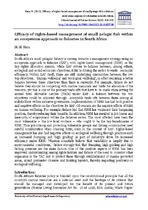Efficacy of rights-based management of small pelagic fish within an ecosystems approach to fisheries in South Africa
Abstract
South Africa’s small pelagics fishery is moving towards a management strategy using an ecosystem approach to fisheries (EAF), with rights-based management (RBM) as the key rights allocation system. While EAF strives to balance between, among others, ecological and social-economic objectives, RBM is driving the sector towards economic efficiency. Within EAF itself, there are still underlying mismatches between the two top objectives, ‘human wellbeing’ and ‘ecological wellbeing’, in effect requiring a better balance between these objectives than there is currently. For example, fishers do not believe they should be competing with marine mammals and birds for allocation of the resource, yet this is one of the primary trade-offs that have to be made when setting the annual total allowable catches (TACs) under EAF. A balance between the two objectives could be achieved through acceptable trade-offs between them among all stakeholders within inclusive governance. Implementation of RBM has had both positive and negative effects on the objectives for EAF. Of concern are the negative effects of RBM on human wellbeing. For example, fishers feel that RBM has weakened their bargaining position, thereby reducing their benefits. In addition, RBM has resulted in job losses and insecurity of employment within the fisheries sector. The most affected have been the most vulnerable — the low level workers — who ought to be the key beneficiaries of RBM. Thus prioritising and protecting vulnerable groups and fishing communities need careful consideration when creating RBM, even in the context of EAF. Rights-based management has also had negative effects on ecological wellbeing through practices such as increased dumping and ‘high grading’ as part of industry’s drive for increased efficiency under RBM. Whereas scientists believe that variability is largely due to environmental conditions, fishers strongly feel that dumping, high grading and high fishing pressure are the main factors. One of the positive aspects of RBM has been improved understanding among rights-holders and fishers of the need to consider other organisms in the TAC and to protect these through establishment of marine protected areas, island perimeter closures and limiting bycatch, thereby impacting positively on ecological wellbeing.

